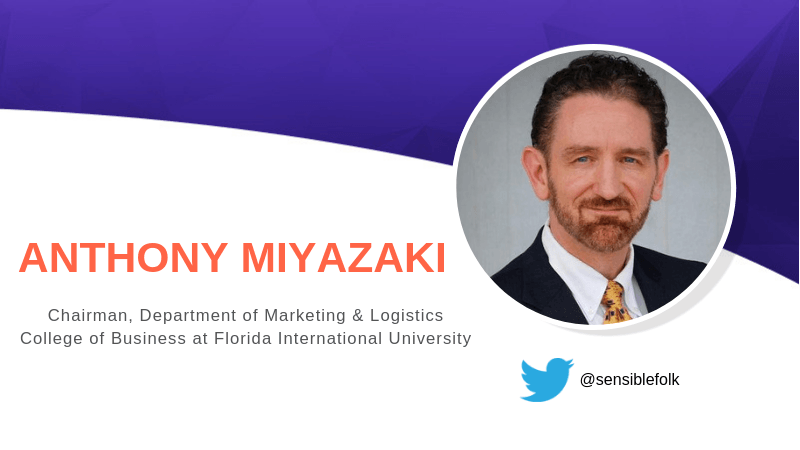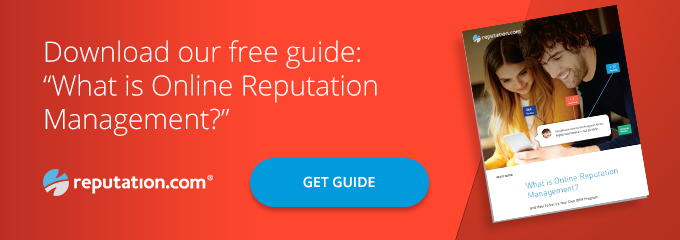Anthony Miyazaki Discusses the Future of Marketing
Reputation Staff Writer


Dr. Anthony Miyazaki is a longtime leader and educator in the field of marketing and analytics. As chairman of the Department of Marketing & Logistics at the College of Business at Florida International University, he gives the next generation the tools they need to work successfully in marketing and public relations. Recently, he spoke with Reputation.com about what changes he has seen over the years in marketing, and what marketers should expect — and be ready for — in the future.
This interview has been edited and condensed.
Dr. Miyazaki, you’ve been teaching marketing for 20 years. How do you keep up with industry changes?
I keep one foot in teaching, but I work with industry people on consulting projects. That’s my way to stay connected all the time. The more you have a connection with industry and work with industry people, the more relevant you are.
In fact, I’m not a big fan of academics who don’t understand the industry and don’t have strong connections to it. I feel like if they’re teaching from their own knowledge, then they’re not teaching enough. And if they’re teaching from a book, they’re probably teaching something that’s two or three years old.
How has working — and hiring — in the marketing field changed?
For 60 years, advertising didn’t change that much. That’s why top management doesn’t understand what’s going on at the lower level now. And because they don’t understand, it’s hard for them to direct. It’s critical for people in those top positions to still stay connected to what’s going on.
Today, we’re much more fragmented in our expertise. Twenty years ago, you could know everything about your job because there wasn’t much to know. Now, you might be an expert in social media or SEO, but you probably won’t be the same all-around expert you would have been 20 years ago.
And everything is faster now, so you’re taking risks more often. Luckily, the public is aware you’re taking risks, and usually, they’ll be nice to you. But if you’re worried about it too much, you’ll pull back because you’ll want to be careful. Being careful probably means you’re not going to take the risks you need to take to be innovative.
Let’s talk about digital marketing for a moment. How has the dawn of this powerful tool affected how marketers do their job?
When I started my career, there was no digital! And when digital first started, we didn’t focus on return on investment in the digital marketplace. We just wanted to be out there.
Then things started to change. We shifted focus to driving traffic — not just from the outside in, but within the website. Then we concentrated on driving the right kind of traffic to and within the website. Then we finally got serious about measuring and building return on investment.
And when social media was introduced, the whole process started again. Today, some people still claim that you can’t measure return on investment with social, which is ridiculous. Of course, you can! In fact, it’s one of the most important things to do.
But I think the biggest change — outside of new platforms and the increase of social media — has been the transfer of power from the brand to the public. The brand doesn’t own the brand anymore. The public does, to some degree.
Take Coca-Cola, for example. There are hundreds of thousands of references to Coke on social media. If the public starts to bring the Coca-Cola brand in one direction, then it’s not so easy for the company to move their brand back where it’s supposed to be.
You stress in your writing that it’s important brands are dependable and innovative. Yet sometimes these qualities can be viewed as opposite.
If you build a brand that people can depend on, they can also depend on that brand being innovative. They think that brand will always come out with something new and fresh.
To be innovative, we should ask, “Will I be memorable and meaningful in my marketing?” That’s what I want, so that I can build my brand and build that reputation of being dependable and/or innovative.
Service is a huge part of a brand’s reputation — almost as big as the product itself. But with social media and third-party review sites, it seems like a business can be broken by a few disgruntled — but vocal — customers. How can businesses protect and defend their reputations?
When you talk about service today, there’s an expectation for perfection. Companies should convey this to their customers: We’re not perfect, but when we’re not perfect, we’ll do our best to make things better. At some point, however, you’ll have to endure the storm.
I think the key with a small company is to find the client base that cares, and not try to grow so quickly that you can’t sustain high service levels. Also, it’s important to build stories within your core audience — don’t just let them happen.
Then, as your company starts to expand, you’ve got those positive stories to tell. Eventually, they’ll reach audiences who aren’t as core to your company. And when that happens, you won’t be able to satisfy those audiences as easily, which means you’ll have to put more effort or time or money — or all of the above — into satisfying those people.
What strategies should marketers and businesses use when they’re just starting out, to build a solid reputation from the ground up?
The more you can get out of word of mouth, the better, because word of mouth is very influential. It’s nice when the online review is backing up what the person is feeling toward that company already.
A consumer will go online and see some positive reviews and some negative ones. If the consumer is already predisposed positively toward the brand, then the positive reviews will resonate much more than the negative ones.
The key is to build up positive experiences with your core customers, because they love you almost no matter what. They want your product, they like your product, they like you, they like what you stand for and they’re more willing to work with you through the growing pains as you build your customer service.
Do you have some advice that any marketer can use?
The concepts behind marketing haven’t really changed over the years, but how we approach marketing has changed. If you can pull people in, you can get them engaged. You have microseconds to get someone’s attention. But once you’ve got them interested, you can keep them for quite some time.
When people leave wanting more — that’s good marketing. That’s the key to marketing in the future. If they feel, “I wish that article would have been longer. I wish that video had been longer. I wish I could have stayed a little bit longer,” you’re likely to get them to come back again.



